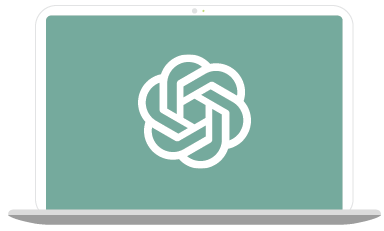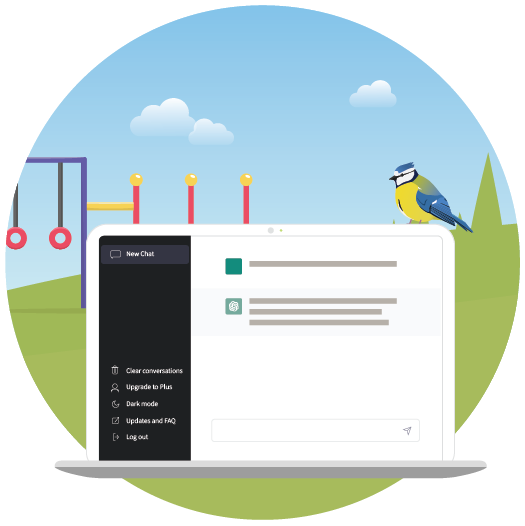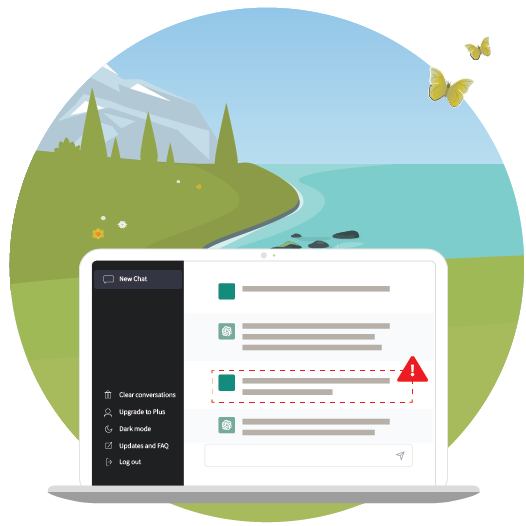
ChatGPT and Safeguarding
What is ChatGPT?
For anyone who hasn’t come across ChatGPT before, it is an incredibly useful tool used by many people all over the world. ChatGPT, in short, is a large language model developed by OpenAI, a research organization that focuses on artificial intelligence and machine learning. Designed to understand and generate human-like responses to natural language input, ChatGPT is great in assisting with content. Whether that be for a blog, an essay, social media posts, you name it, if ChatGPT has an answer, it will generate a response. You can ask ChatGPT to add humor, wit, profession to its responses and it will give you just that!

The Technology Behind ChatGPT
Trained on a huge amount of text data using a technique called unsupervised learning, ChatGPT is able to generate coherent and contextually relevant responses to a wide range of questions and prompts (as long as you don’t ask it anything that’s happening in the world right now). There are many other language models much like ChatGPT that use the same underlying architecture, but with varying sizes and levels of training data, meaning some will have more knowledge than others and the given responses in turn will reflect this.
The technology behind ChatGPT has numerous applications, including language translation, question-answering and conversational agents. It is an absolutely fantastic tool!
ChatGPT and Schools
As you can imagine, many students have come across ChatGPT and have put it to the test. Asking for answers so they can complete homework. But instead of taking the ChatGPT response, manipulating it and making it their own, they’ve simply copied and pasted, and hoped that nobody would cotton on. Well, schools have cottoned on and now ChatGPT is being blocked by schools so that students cannot use and abuse it.
ChatGPT can provide informative and educational responses to many questions, but it is important to understand that responses are generated by a machine learning algorithm and therefore the information provided may not always be completely accurate or reflective of reality. Schools want to encourage students to develop critical thinking skills to seek out information from multiple credible and reliable sources. By encouraging this, they are enabling students to evaluate credibility and reliability and setting them up with important critical thinking skills they will go on to use throughout their life.

Risks to Online Safety
Using it to write essays is one thing but ChatGPT enables students to ask things that aren’t necessarily deemed appropriate. This creates a risk to a child’s online safety. Schools ordinarily block harmful and inappropriate content wherever possible, stopping students having access to certain websites, etc. But like anything, as soon you block one, there is something else popping up causing distractions, giving them access to inappropriate content and putting them or others at risk.
Schools have a responsibility to ensure that students are accessing appropriate and safe content while using school devices or networks. ChatGPT, like many of the other AI language models, generate responses to a wide range of questions, which include those that may be deemed inappropriate or harmful for children, such as explicit content or hate speech.
As an AI language model, ChatGPT is not programmed to differentiate between an adult or a child asking a question. However, there is some form of comfort in knowing that if a child was using ChatGPT and asked an inappropriate or unsafe question, ChatGPT would not provide explicit or harmful content in response and instead, would aim to provide a response that is age-appropriate and sensitive to the child’s emotional needs, while also avoiding harmful or explicit content.
‘As and AI language model, I am programmed to provide information and educational responses to a wide range of questions, including those that may be deemed inappropriate or unsafe for children. However, it is important to note that my programming is designed to promote responsible and ethical use of technology, and I take measures to avoid providing explicit or harmful content, especially when interacting with children or other vulnerable individuals’ – ChatGPT
‘ If a child were to ask a question that is deemed inappropriate or unsafe, I would not provide explicit or harmful content in response. Instead, I would provide a response that is age-appropriate and sensitive to the child’s emotional needs, while also avoiding explicit or harmful content. Depending on the specific question, this may involve redirecting the child to a more appropriate topic or encouraging them to ask an adult or trusted authority figure for guidance or support’ - ChatGPT.

Safeguarding with Senso
Thousands of schools are already implementing Senso’s Safeguard Cloud because we offer a top-level overview and reporting of any violations across a single or multi-site setup. We deliver an unparalleled insight into a user’s actions and behaviors using advanced AI-driven visual threat analysis, which is developed with usability in mind. Our monitoring enhances your safeguarding efforts and abilities with comprehensive keyword libraries developed in partnership with expert organizations. Each violation is provided with a screenshot which is then analyzed by our AI driven threat analysis engine to highlight whether the content a user is accessing may be harmful or inappropriate.
Reviewing violations is flexible and enables you to pinpoint those that need immediate support. Full browsing history also gives you the ability to understand online activity in a wider context. You can log and block with ease.
Safeguarding Against ChatGPT
With Senso you can easily monitor users' activity. This comes in handy with websites like ChatGPT, by clearly indicating users who have accessed the website and blocking it with immediate effect. Our safeguarding dashboard gives you a better understanding of issues and online behavior across one or multiple sites, including key data around users, devices or libraries triggering the most violations. To put it simply, Senso has an intuitive management dashboard meaning you can prioritize and manage concerns with ease.
We help to support technical teams and teachers to ensure they are able to work smarter, not harder, taking away any additional unwanted stress! Senso’s safeguard platform is designed to support schools with monitoring. In this case, we can help to monitor the use of ChatGPT and other AI language model applications. We can block any websites which are deemed inappropriate or considered distractions and monitor each individual student’s online behavior.

Want to know more?
Do you want to know more about Senso and how we can help to support your school in enhancing your safeguarding capabilities? Please don’t hesitate to get in touch. We’d love to hear from you!